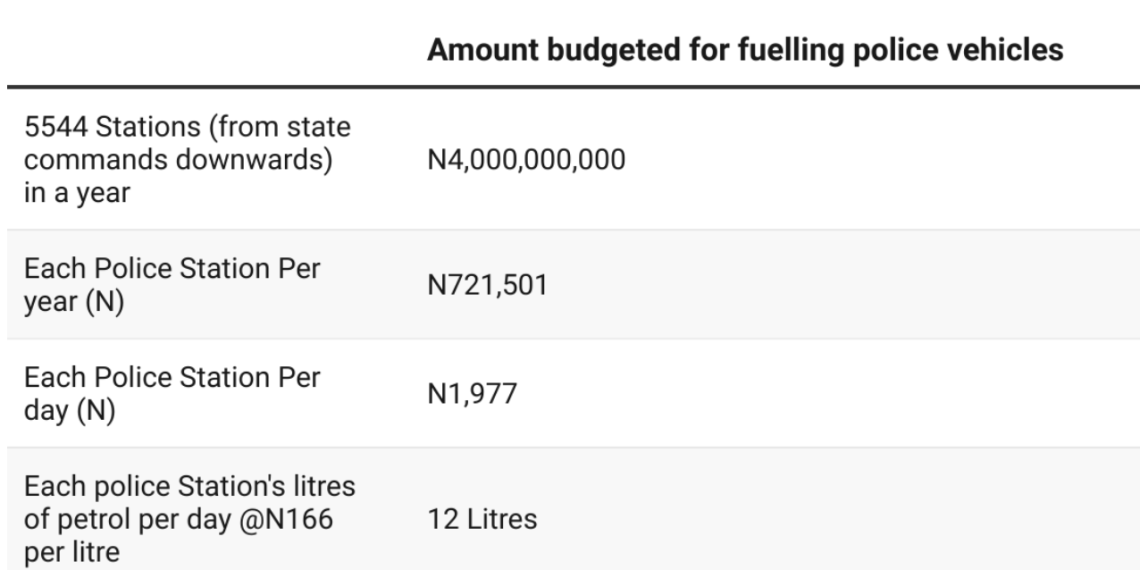Nigeria’s minister of police affairs, Muhammad Dingyadi revealed that the government approved over N4 billion in the 2021 budget to fuel police vehicles in all the police commands of the country. This sum is meant to provide fuel for Police vehicles ranging from sedans, pickups, and armoured vehicles used in operations.
Findings by Dataphyte, however, showed that only 3.5 billion naira was budgeted for “fuel/diesel/lubricant for direct delivery to state commands” in the 2021 supplementary budget. The research team could not find any other line item described as such in the approved main 2021 budget.
.png)
It has been widely reported that this is the first time the federal government would provide such a high amount of money for the fueling of police vehicles. Yet, even the purported budget of “over N4 billion” falls far below the estimates of the Inspector General of Police (IGP).
In November 2020, the Inspector General of Police (IGP), Mohammed Adamu had stated that he would require a budgetary allocation of N24.8bn to fund the fueling operations of police vehicles. He held that N22.5 billion will be spent on police vehicles that have a petrol engine, motorcycles would require N834.4 million to fuel, and N1.4 billion would cover the fueling of vehicles using diesel.
-1708865156.png)
Police Stations in Nigeria, 2017
Source: National Bureau of Statistics (NBS) Survey 2017
The Nigerian Police Force, which dates back, over 200 years, to 1820, is headquartered in Abuja, the Federal Capital Territory. It has 12 zonal commands, each overseeing 3 states, except its 9th Zone in Umuahia which covers 4 states. There are 37 police commands in each of the 36 states and the FCT.
The state police commands oversee area commands, divisions headquarters, Police stations, Police posts and police village posts.
A National Bureau for Statistics (NBS) Survey 4 years ago shows that there are no less than 5,556 police stations in Nigeria, with at least one police station in each local government in Nigeria. The question then is: will the recent provision of N4 billion cater for the fuelling of the operational vehicles of the 5,556 outposts of the Nigeria Police Force?
-1708865198.png)
The IGP then in 2019 said ‘’the police force needed more funding for neutrality and to avoid compromise in the discharge of its statutory duties’’. The EndSARS movement of 2020 also called for an increase in salaries and reform of the Nigerian police force.
Going by the N4 billion approximated figure that the Police Affairs Minister gave, and using the number of police outposts as of 2017, from the state police command downwards, it means, each police station, regardless of its operational size, would have less than N2,000 a day to fuel their operational vehicle(s), whether the vehicles are owned by the Police or hired. This is besides the cost of “lubricants” and other maintenance costs of their operational vehicles.
-1708865237.png)
With the current price of fuel in Nigeria, each police station in Nigeria would be bloke receiving N719,942 per year for fueling operational vehicles. It follows that each police station gets a total of 1,972 per day for fueling, which gets them less than 12 litres of petrol, going by the current average price of fuel in Nigeria which is N166.
Expecting that the number of police outposts would have increased over four years, how realistic is providing each police outpost in Nigeria with much less than N2,000 a day to fuel its vehicle(s) for effective patrols and prompt response to crime?
The Nigerian crime scene is defined by terrorism, political instability, and violence. Nigeria is the 17th least peaceful country in the world. Based on the global terrorism index, Nigeria is the third most affected by terrorism in the world and also the second-highest country with risk of genocide and mass killing in Africa, this is due to the high population density and previous history of mass killing.
Without a doubt, transportation is required for the fight against crimes and lack of basic resources like vehicles and fuel for those vehicles could impede effective police response to emergency situations, and hinder the police from fighting crimes effectively.
As of 2017, 135,000 crimes were reported in Nigeria of which 70,000 were related to property crimes and 50,000 were concerned with crimes against persons.
A recent interview of a policeman under anonymity by Daily Trust said they (Police operatives) lacked funds to fuel their vehicles and lack of fuel has made most of their vehicles useless and grounded.
Another policeman also said that they often relied on money gifted to them by ‘’good samaritans’’ to fuel their vehicles; he also mentioned that the amount paid by complainants is also often used.
There is the widespread belief that the lack of adequate funding has contributed to the corrupt practices of police officers in Nigeria. Most of the officers resort to seeking bribes and charging illicit funds in order to survive, and for the running of their various stations.
Matching a highly publicised N4 billion annual budget for running police vehicles with either the police executive’s request of N24.8 billion for the same or matching the amount with the security needs and crime rate in Nigeria appears to be more of a sobering token than cheery news.



.png)
-1708865156.png)
-1708865198.png)
-1708865237.png)